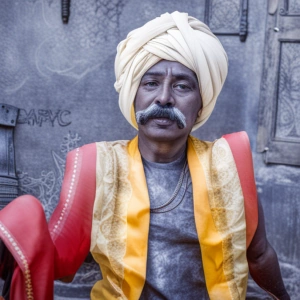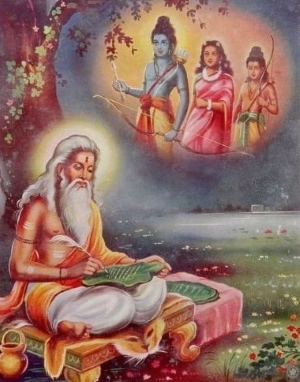Akho (Akha Bhagat) - His Life And Legacy

Discover the inspiring life and legacy of Akho (Akha Bhagat), a revered saint and poet from Gujarat, India. Learn about his teachings and impact on society.
Akha Bhagat, also known as Akho, was a medieval Gujarati poet who lived in the 15th century CE. He lived in Jetalpur near Ahmedabad, and later moved to Ahmedabad. He is regarded as one of the most important poets of medieval Gujarati literature and is known for his satirical poems written in the Chhappa literary form. Akha Bhagat's residence in Ahmedabad, a small room in Desaini Pol at Khadia, is known as 'Akha no Ordo' which means 'a room of Akha'. In Rajkot, Kothariya naka (one of the gates of the fort) is named after him, 'Akha Bhagat Chowk'.
How Akho developed vairagya
Akha Bhagat became an ascetic after his parents, sister, and two wives died. Two incidents embittered him towards worldly life.
He was a goldsmith known for his honesty. A woman he considered a sister asked him to make a gold necklace worth 300 rupees. Akha added 100 extra rupees worth of gold to make it more impressive. But the woman doubted his honesty and asked another goldsmith to check it. The other goldsmith removed the extra gold to prove Akha was dishonest.
Akha was an officer in the mint in Ahmedabad during Mughal Emperor Jahangir's reign. Some officials accused him of mixing something with the coins.
Even though his integrity was eventually established in both these incidents, Akho became disillusioned with the world.
Spiritual life of Akho
Akha wandered in search of a spiritual guide until he arrived in Gokula, where he received initiation into Vaishnavism from Guru Gokulnathaji who was the grandson of Vallabhacharya. He also held great devotion for Guru Brahmananda.
Akho's teachings
Akha believed that God could be realized through devotion (bhakti) and knowledge (jnana). His philosophical doctrines reflected the Pushtimargiya Vaishnavism of Vallabhacarya, the Advaita Vedanta of Adi Shankaracharya, and the Nirgunopasana of Kabir. Akha criticized the selfish motives of religious custodians of his time, who were exploiting the common people. He had thousands of followers, and Lala Dasa established an order of spiritual successors to spread his message.
In addition to his literary contributions, Akha Bhagat is also remembered for his role as a social reformer. He was a vocal critic of the caste system and the oppression of women, and he used his platform as a poet to advocate for social justice and equality.
Works of Akho
- Akhe-gita
- Panchikarana
- Guru Shishya Samvada
- Guru Mahatmya
- Sarvottama Bhava
- Prema Lakshana
- Jivan Mukta Dasha
- Brahma Lila
- Brahma Vasu Nirupana
- Chitta Vichar Samvada
- Santa Priya
- Santona Lakshano
- Anubhav Bindu
- Avasthanirupan
- Kaivalya Gita
He also shared his spiritual experience and knowledge in Chhappa, the poetry writing style he followed for lending his philosophy in verse.
Akha Bhagat's Chhappas, which are six-stanza satirical poems, are full of humor and pass metaphorical comments on different aspects of spirituality and human life. His works reflect his devotion to God and his belief in the power of Bhakti to achieve spiritual progress.
Akha Bhagat was a prolific writer and his literary output includes a wide range of works, from spiritual treatises to devotional poetry. His writings are known for their simplicity, clarity, and directness, and they continue to be popular among readers and scholars alike. He is considered a significant figure in the Bhakti movement and his works continue to be studied and appreciated by scholars and devotees of Gujarati literature. His poems are full of references to Hindu scriptures, and they often convey complex philosophical concepts in a simple, accessible way.
One of Akha Bhagat's most famous works is his Akhe-gita, which is a collection of poems that explore various aspects of Bhakti and Jnana. The work is divided into forty sections, each of which explores a different theme, such as the nature of the self, the importance of spiritual practice, and the role of the guru in the spiritual journey.
Today, Akha Bhagat is regarded as one of the most important figures in the history of Gujarati literature, and his works continue to be studied and celebrated by scholars and readers alike. His legacy as a poet and social reformer is a testament to the enduring power of literature to inspire and transform society.

English
Sages and Saints
Click on any topic to open
7
30
Astrology
Atharva Sheersha
Bhagavad Gita
Bhagavatam
Bharat Matha
Devi
Devi Mahatmyam
Ganapathy
Glory of Venkatesha
Hanuman
Kathopanishad
Mahabharatam
Mantra Shastra
Mystique
Practical Wisdom
Purana Stories
Radhe Radhe
Ramayana
Rare Topics
Rituals
Rudram Explained
Sages and Saints
Shiva
Spiritual books
Sri Suktam
Story of Sri Yantra
Temples
Vedas
Vishnu Sahasranama
Yoga Vasishta